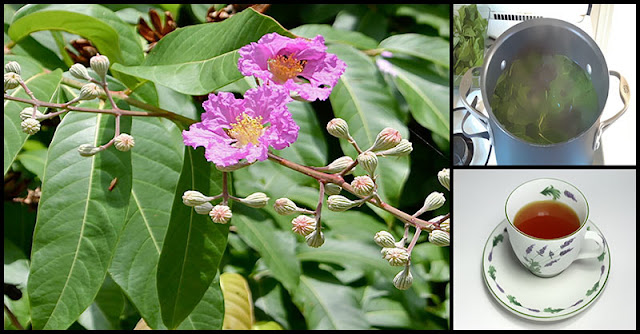Banaba is a tropical flowering tree plant with 12 meters high and is famously consumed in the Asia and surrounding countries. Its large green spacious leaves are about 4 inches in width and 8 inches in length while its flowers are colored pink to lavender. It is used as an alternative treatment for any sugar-related sickness and an additive to weight-loss as it has been concluded to reduce the digestion of carbohydrates in the human body.
Banaba is a powerhouse of vitamins and minerals such as magnesium and zinc. It is also rich in dietary additive and found in its leaves and flowers is a compound known as corosolic acid, which is being researched for its insulin-like effect of reducing the glucose in the body. Extracts of the leaves can also be used as a treatment for high blood pressure, hypoglycemia, and diabetes.
The Contents of Banaba Leaves:
Polyphenols – a group of chemicals found in plants which are mainly used as a natural antioxidant.
Saponin (leaves and bark) – secondary metabolites that are widely available in nature.
Flavonoids – a group of the largest phenol compounds found in nature. These compounds are substances in blue, red, and purple.
Plastisol– substances such as insulin sort of insulin plant.
Health Benefits of Banaba You May Have Not Known Before:
May Help Prevent Cancer
One of the main components of Banaba is corosolic acid, which can kill human colon cancer cells. Aside from this, corosolic acid can also obstruct 12-O-tetradecanoyl phorbol-13 acetate, a compound that encourages preexisting tumors to grow.
Diabetes Herbal Remedy
In some parts of the world, Banaba leaves extracts is used as herbal remedy for diabetes. Its extracts have high levels of corosolic acid, which has shown to have an anti-diabetic effect. It has the ability to decrease blood sugar levels, decrease appetite and carbohydrate cravings, and regulate insulin and glucose levels. Test on animals revealed that an extract of Banaba leaves may reduce blood glucose, improve insulin, and increase hypoglycemia.
How To Use Banaba Herb For Diabetes?
Dry Banaba leaves and fruits out in the fields and cut into smaller portion. Boil dried leaves and fruits in hot water (1 cup of dried leaves and fruits to 1 cup of water). Let it steep for 30 minutes. Get the extract by straining the leaves and fruits. Take the Banaba herbal tea for 3 times daily.
Promotes Weight Loss
Banaba leaf extract optimizes the conservation of energy in the body, and thus reduces appetite by encouraging glucose storage molecules (starch and/or glucagon) to not be broken down.
It also lowers cholesterol and triglyceride levels as well as decreases the production of fat cells (adipocytes).
May Help Prevent Liver Disease
A liver disease known to be nonalcoholic steatohepatitis is caused by an excessive fat build up in the liver. The major cause of this disease is excessive fructose (sugar) consumption.
Banaba extract consumed by rats had shown to decrease liver damage associated with nonalcoholic steatohepatitis and lower total cholesterol and blood ALT levels.
May Improve Heart Health
Found in Banaba extracts are gallotannins, which are a subclass of tannic acid. Tannic acid inhibits the production of endothelin-1, a protein that is directly involved in heart disease.
Antiviral
Corosolic, ellagic, and gallic acid in Banaba leaf extract hinder enzymes that are being used by viruses to take over human cells (proteases and reverse transcriptase). These acids can help in preventing viral infections from pathogens such as HIV and HRV-4 (Human Rhinovirus).
Antibacterial
Due to the antibacterial activity caused by the tannins and triterpenoids (bioactive molecules), Banaba leaf extract derived from water, instead of alcohol, can successfully impede the growth of harmful bacteria such as E. coli., S. aureus, P.aeruginosa, and B. subtilis.
Anti-Inflammatory
An experiment in rats demonstrated that corosolic acid in Banaba leaf extract can help prevent inflammation by inhibiting arachidonic acid formation, thus preventing prostaglandin and leukotriene formation.
Leukotrienes are cells that release inflammatory cytokines while prostaglandins are the hormones that induce pain as a side effect.
In cells, Banaba extract blocks the activation of the inflammation-causing NF-kappaB.
Antioxidant
In rats, Banaba leaf extract reduced superoxide levels, such as dismutase. If left alone, dismutase can increase bacterial survival rate at an infection site and prevent cells from functioning. Aside from this, Banaba extract also helped increase levels of catalase. Catalase is an antioxidant enzyme in the body that helps neutralize H2O2, a harmful, reactive oxygen compound.









